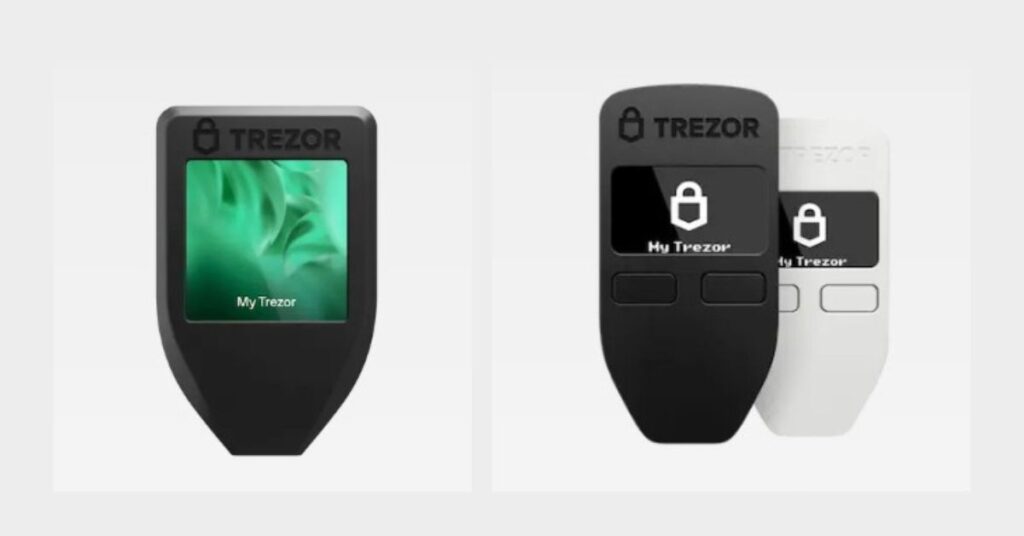Overview
Trezor is a popular hardware wallet used to store cryptocurrencies securely. It is a small device that can be connected to a computer or mobile device to manage cryptocurrency transactions.
Many Bitcoiners ask, “ What if Trezor goes out of business? Will I lose my crypto?”
This blog post will explore the unlikely possibility of this company going out of business and what it means for users relying on this hardware wallet to store their funds.
It is an important topic because the security of one’s digital assets is crucial in the world of cryptocurrencies.
This blog post aims to inform readers about the risks of Trezor going out of business and provide recommendations on how to mitigate those risks.
What Happens If Trezor Goes Out Of Business?

If Trezor were to go out of business, several scenarios could arise and potentially affect users.
No Support For Existing Trezor Devices
One possible scenario is that there would be no support for existing Trezor devices, meaning that users would no longer be able to receive updates or technical support for their hardware wallets.
That could lead to security risks, such as vulnerabilities that are not addressed, making it easier for attackers to steal cryptocurrencies.
Loss Of Access
Another scenario is that users could experience a loss of funds if they are unable to access their wallets or transfer their cryptocurrencies.
While it is difficult to predict the likelihood of Trezor going out of business, it is always wise to consider the possibility and take measures to mitigate those risks.
Malfunction
Third, users could potentially lose their funds if they cannot access their cryptocurrencies due to a malfunctioning or unsupported Trezor device.
Way To Mitigate The Risk Or Trezor Going Out Of Business
The likelihood of Trezor going out of business is difficult to determine, but it is vital to acknowledge the possibility and prepare accordingly.
To mitigate the risks associated with the potential loss of Trezor support, users can take specific steps, such as regularly backing up their recovery seed, using a multi-signature setup, and keeping their firmware up-to-date.
Additionally, consider alternative hardware wallets and keep up-to-date with news and developments regarding Trezor and other hardware wallets like Ledger.
What happens if Ledger goes out of business or is lost or stolen? The answer is in our post here.
Altenatives To Trezor
If users are concerned about Trezor going out of business, it may be wise to consider alternative hardware wallets to store their cryptocurrencies securely.
Some popular hardware wallets include Ledger, KeepKey, and Coldcard.
Each alternative hardware wallet has its pros and cons. For example, Ledger has a sleek design and supports many cryptocurrencies, but it can be more expensive than other hardware wallets.
KeepKey has a large screen and is more affordable, but it may not support as many cryptocurrencies as other wallets. Coldcard is known for its security features but can have a steeper learning curve for new users.
To choose the right alternative hardware wallet, users should consider their specific needs and preferences, such as the number and types of cryptocurrencies they plan to store, their budget, and their desired level of security.
It is also important to research each wallet thoroughly and read reviews from other users to make an informed decision.
Ultimately, the best hardware wallet is one that meets the user’s individual needs and provides a high level of security for their digital assets.
When it comes to crypto wallets, ease of use is critical. Read our Which Is Easier To Use Trezor Or Ledger? (Best In 2023)
What To Do If Trezor Goes Out Of Business
If Trezor were to go out of business, users would need to take The following steps to protect their cryptocurrency holdings.
- The first step is to back up the recovery seed for their Trezor device, a series of 12 words that can be used to recover the wallet’s private keys in the event of loss or damage. This seed should be stored in a secure location and kept confidential.
- The next step is to transfer any cryptocurrency funds stored on the Trezor device to another wallet or exchange that is supported and trustworthy. This will ensure that users can access their funds if the Trezor device becomes unusable or unsupported. (If your Trezor is unresponsive, use the recovery seed to restore your assets on an alternative wallet that supports a 12-word recovery phrase.)
- It is also essential to stay informed about any developments related to the situation with Trezor and to monitor the security of any alternative wallets or exchanges used to store cryptocurrencies. This will help users stay aware of any potential risks or vulnerabilities that may arise.
There are several resources available to help users navigate this situation, such as online forums, social media groups, and support pages for specific hardware wallets or exchanges.
It is recommended to use these resources to stay informed and to seek guidance from trusted sources.
Has Trezor been hacked? Is Trezor still hackable in 2023? Read in-depth about it here.
Trezor FAQs
Is Trezor One obsolete in 2023?
No. It is not outdated. It keeps crypto safe. Users just need to keep up with firmware updates.
What happens if Trezor fails?
If, for any reason, Trezor fails, just use the recovery phrase to restore your cryptocurrency on a new device or a software wallet.
What happens if my Trezor is destroyed?
Same as above.
What happens if someone steals my Trezor?
They cannot get to your assets if they don’t have your PIN and passphrase. Buy a new Trezor, restore your wallet, set up a new wallet address, and transfer your crypto there.
Can Trezor wallet be traced?
In Trezor Suite, use the Tor function, which acts like a VPN and hides your physical location.
Conclusion
The potential for Trezor to go out of business highlights the importance of taking measures to protect one’s cryptocurrency holdings.
If Trezor were to become unsupported or unusable, users might risk losing access to their funds.
To mitigate these risks, users can consider alternative hardware wallets, regularly back up their recovery seed, and stay informed about any developments related to their cryptocurrency holdings.
It is important to remember that no single hardware wallet or exchange can guarantee complete security for one’s digital assets. Users must actively protect their holdings by staying informed, using best practices for wallet security, and considering multiple storage options.
Ultimately, the goal is to minimize the risk of losing access to one’s cryptocurrencies and to ensure that funds can be safely transferred to other wallets or exchanges. By taking proactive measures, users can help to safeguard their investments and minimize potential losses.
We encourage all cryptocurrency holders to stay vigilant and take steps to protect their digital assets if Trezor or Ledger, or any other hardware wallet becomes unsupported.
If you still need a hardware wallet, we recommend researching and choosing one that fits your needs. Remember to keep your private keys safe and secure, and avoid sharing them with anyone. You can protect your cryptocurrency assets and invest confidently by taking the necessary precautions.
For a more in-depth discussion of what is safer Ledger or Trezor wallets, Ledger and Trezor supported coins, read our Trezor VS Ledger: Which Hardware Wallet Is Best In 2023.


